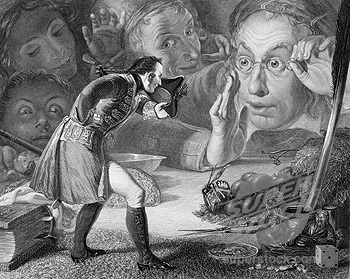
Continuing the discussion on how Gulliver’s Travels can help us handle the challenges of political disillusion, I turn to Book II, where Gulliver finds himself stranded in the land of the giant Brobdingnags. In Book I, as I noted in the last entry, Gulliver can remain aloof from human perversity—and when, in the end, it begins affecting even him, he can run away. In Book II, he does not have this luxury.
That is because the actions of others impact him directly. If a farmer chooses to overwork him for profit, if a giant dwarf decides to play tricks on him, his very life is threatened. He cannot hold onto his ideals by pretending that human perversity is something that can be overlooked.
So how does he hold on to his ideals? By becoming a fanatical believer. We see this in his long conversations with the Brobdingnag king. The Brobdingnags live in a simple utopian society, and the king wants to hear all about the world the Gulliver comes from. Gulliver gives, to say the least, an overly idealistic picture of English and European society. He paints everything in the rosiest of lights: the court, the political system, the judicial system, the educational system, etc. Gulliver is describing our institutions as we wish they were.
The king, however, is no fool and is able to see beneath Gulliver’s passionate advocacy to the actual facts. What he sees horrifies him. In fact, he comes to a conclusion that is one of the strongest indictments ever leveled at humankind: “I cannot but conclude the Bulk of your Natives, to be the most pernicious Race of little odious Vermin that Nature ever suffered to crawl upon the Surface of the Earth.”
This actually is a conclusion that Gulliver will himself arrive at by the end of Book IV, but put that aside for the moment. Seemingly unfazed by the king’s criticism, the oblivious Gulliver of Book II shrugs off the criticism and then goes on the damn himself and his country even further by singing the praises of gunpowder.
Here’s what I think is going on here. Gulliver handles the flaws of humanity by arguing forcefully that his country is perfect. It’s like, say, the politician who pretends that everything is going well (say, in Iraq) just because he asserts forcefully that everything is going well. One suspects that such forceful assertions are as much designed to override internal doubts as to convince others.
To summarize, how does Swift say we handle the fact that the world is not living up to our ideals? By ignoring the facts and arguing passionately that the world is living up to the ideals.
Note that the ego is involved here as well. Gulliver feels small in this world, but the way that he can imagine that he is big is by convincing the Brobdingnag king that he comes from an exemplary world. When he fails to convince, he then tries to persuade the king that his world is great because it has gunpowder.
Another way that Gulliver tries to convince the king that he is big, by the way, is leaping over a pile of cow dung. To the amusement of everyone, he only makes it halfway over, and the episode works as a parable: try to impress people that you’re bigger than your are, and you’ll end up in the middle of a pile of s–t.
The world is full of people who argue passionately for their country or their party or their cause rather than acknowledge the ways those entities come up short of the ideal. They feel that if they are loud in their advocacy, they will silence all doubts. One senses that, underlying their fanaticism lurks a desperate fear. This fear is that, if they were to admit any doubts, they would fall into utter disillusion—which, in fact, happens with Gulliver in Book IV.
Swift, however, would not say that the antidote to false optimism is total cynicism. Just by acknowledging that you’re small and flawed doesn’t mean that you are unredeemable. Laugh at yourself for thinking that you could be a giant but then go about your work as best you can. Just because you can’t create ideal structures doesn’t mean that you shouldn’t try. Just keep a healthy sense of perspective, and a healthy sense of humor, about it all.
I should note that Swift himself was involved in a hopeless endeavor for his entire life, which was protecting the rights of the Irish. This at a time when the Irish were seen as an inferior race whose only purpose was to provide England with income. If Swift had been satisfied only with perfection, he would have given up the fight soon after becoming Dean of St. Patrick’s Cathedral. But he never did.

